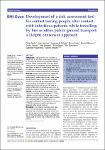Development of a risk assessment tool for contact tracing people after contact with infectious patients while travelling by bus or other public ground transport: a Delphi consensus approach
Mohr, Oliver
Hermes, Julia
Schink, Susanne
Askar, Mona
Menucci, Daniel
Swaan, Corien
Goetsch, Udo
Monk, Philip
Eckmanns, Tim
Poggensee, Gabriele
Krause, Gérard
Background: Tracing persons who have been in contact with an infectious patient may be very effective in preventing the spread of communicable diseases. However, criteria to decide when to conduct contact tracing are not well established. We have investigated the available evidence for contact tracing with a focus on public ground transport aiming to give guidance in what situations contact tracing should be considered. Methods: Relevant infectious diseases suitable for contact tracing in ground transport and a set of disease-specific epidemiological criteria were defined through literature search and structured multistep expert consultations. We developed continuous scales for each criterion to be rated for its relevance to contact tracing in ground transport. We used the Delphi method with an international expert panel to position the values of criteria on the respective scales. Results: The study led to the development of the ‘Contact Tracing-Risk Assessment Profile’ (CT-RAP), a decision-making instrument, taking into account pathogen-specific as well as situation-specific criteria. This report describes the methodology of this instrument and presents two examples of ready-to-use CT-RAP for tuberculosis and for meningococcal disease in public ground transport. Discussion: The systematic and transparent use of the CT-RAP for tuberculosis and meningococcal disease is likely to facilitate reasonable, efficient and user-friendly decisions with respect to contact tracing. New CT-RAPs for additional pathogens and different settings such as schools and kindergartens are being planned.
No license information

